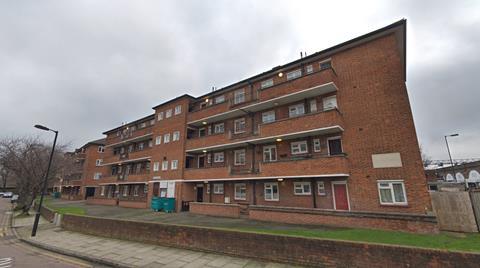Developer working with six London councils to build homes on existing buildings
Rooftop housing developer Apex Airspace has revealed ambitious plans to build 10,000 affordable homes in the next decade, using modular construction techniques.

The London-based group, formed three years ago by chief executive Arshad Bhatti, will start work early next year on a scheme for Lambeth & Southwark Housing Association, building affordable flats above two existing residential blocks in Bermondsey, south London.
The buildings, called Antony and Roderick (pictured), are currently occupied and work starting in March will see two storeys added, using steel frame technology, to create a total of 30 homes.
The two blocks will eventually be linked by a new central area and feature two book-end spaces, also built by Apex Airspace. A new lift will be installed, and the group will landscape the surrounding grounds.
The 30-staffed firm has also completed two private rooftop homes, in Camden and Hampstead in north London, and is working on three more sites, developing 33 units.
Speaking to Housing Today, Bhatti said the group was actively working with six local authorities across the capital to develop similar modular housing schemes. The Bermondsey project is planned as the start of what he hopes will be a programme to deliver thousands of affordable homes – either affordable rent or social rent – across the capital and beyond.
“We’ve a pre-app in with one council for 120 homes and I’m confident that [soon] all London councils will be looking to do this. Currently pretty much all 33 councils are at least considering it. They’re on a journey; they’re understanding it and appreciating how to use existing assets.
“The land is there and we can build on it. The question is: how do you scale it? The GLA [Greater London Authority] and Homes England funding programmes have been key milestones in councils’ understanding into how to mitigate risk,” he added.
Earlier this year Homes England backed Apex Airspace with £9m of funding, while the GLA pumped in £10m through a revolving development loan facility. The SME-focused Business Growth Fund also made an initial equity investment in the firm of £6.3m in 2018, topping that up with a further £3m this year.
“We’ve a pipeline of 1,500 homes and we plan to build 10,000 units in 10 years, with 3,000 in the next five years,” said Bhatti, who added that the group was “talking to a couple of [unnamed] very big players in the modular space to take things to the next level”.
Apex Airspace has manufacturing deals with three modular factories across the UK to build its units – Bhatti declined to name them – but no imminent plans to start up its own modular production plant. “We’re not considering it actively at the moment. Instead we’re focusing on making the airspaces work, looking at the affordable angle and at what the customer needs,” he said.
“We’re looking more at the specification, the financing and planning side, how to make them affordable, the community buy-in. And the design. We want to make them carbon-neutral and sustainable,” he added.
Bhatti said his firm worked with architects HTA and Farrells, while the group’s factory suppliers also had in-house design teams.
“We are unlocking a way to deliver affordable housing in London. There’s no land cost which helps them work as affordable,” he added.
Bhatti said the Airspace operation was expected to report £20m in turnover next year, up from £1m in 2018. In August the firm appointed former Mace executive Jonathan Poole as its new construction director.











No comments yet